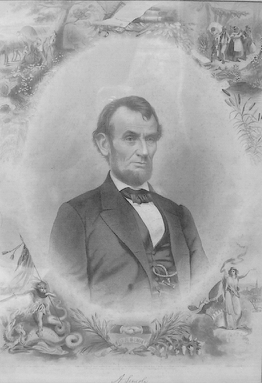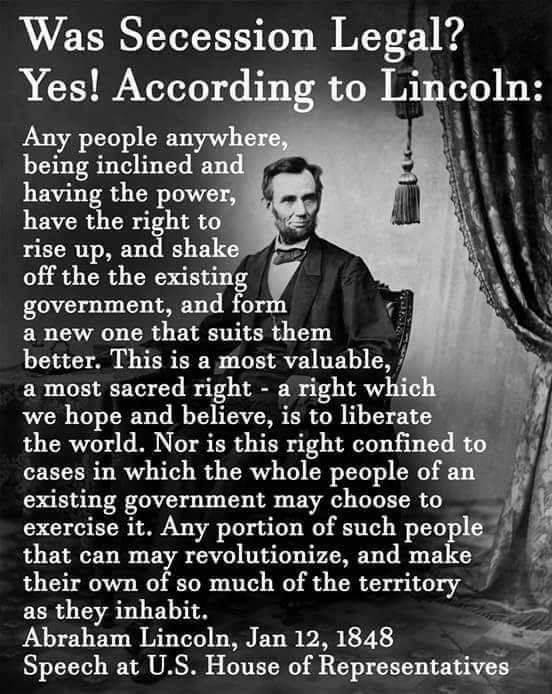 The title of this article is a legitimate question – not only for Lincoln, but for the rest of us as well. Do our political actions reflect our theology? If you look today at some of these Democrats and RINO’s that hate Trump and will do or say anything to hurt his agenda, true or not, (and most of the time it isn’t) you have to ask if what they are doing reflects their theology – and if it does – then what does it say about the god they serve?
The title of this article is a legitimate question – not only for Lincoln, but for the rest of us as well. Do our political actions reflect our theology? If you look today at some of these Democrats and RINO’s that hate Trump and will do or say anything to hurt his agenda, true or not, (and most of the time it isn’t) you have to ask if what they are doing reflects their theology – and if it does – then what does it say about the god they serve?
Similar questions were not always asked about Abraham Lincoln because back then most people didn’t equate a man’s theological perspective with what he did politically. Then, as today, they should have. There is more connection there than most people realize.
I’ve dealt with Mr. Lincoln’s religious views in the past, but not for awhile, so it might not hurt to go back and refresh our memories about them. Ward H. Lamon wrote a book, published in 1872 – The Life of Abraham Lincoln: from his birth to his inauguation as president. Lamon probably knew Lincoln as well as anyone. And Mr. Lamon quoted, in his book, another man who knew Lincoln as well as anyone, his law partner for years, William H. Herndon. Herndon said of Lincoln: “As to Mr. Lincoln’s religious views, he was, in short, an infidel-atheist. He did not believe that Jesus was God, nor the Son of God–was a fatalist, denied the freedom of the will. Mr. Lincoln told me a thousand times, that he did not believe the Bible was the revelation of God, as the Christian world contends.”
With a world view like that, how do you think he would deal with his political adversaries? Does the word “treacherously” come to mind?
Lew Rockwell wrote an article back in May of 2000 called The Genesis of the Civil War in which he made some interesting observations. Mr. Rockwell took pains to note that the War of Northern Aggression in the 1860s was not really a “civil war” as a civil war is one where two opposing groups are fighting for control of the same country–and that was never the South’s objective. The North wanted total control if it all – the South just wanted to separate and go its own way. Mr. Rockwell deals with that by saying: “But why would the South want to secede? If the original American ideal of federalism and constitutionalism had survived to 1860, the South would not have needed to. But one issue loomed larger than any other in that year as in the previous three decades: the Northern tariff. It was imposed to benefit Northern industrial interests by subsidizing their production through high prices and public works. But it had the effect of forcing the South to pay more for manufactured goods and disproportionately taxing it to support the central government. It also injured the South’s trading relations with other parts of the world. In effect, the South was being looted to pay for the North’s early version of industrial policy. The battle over the tariff began in 1828, with the ‘tariff of abominations.’ Thirty years later, with the South paying for 87% of federal tarff revenue while having their livelihoods being threatened by protectionist legislation, it became impossible for the two regions to be governed under the same regime. The South as a region was being reduced to slave status, with the federal government as its master.” Do you think no one in the North realized this? The average man may not have, but the Northern politicians and political thinkers did. What do you suppose their theological world view was? Three guesses!
And obviously Mr. Lincoln understood this. He was no dummy and, as a lobbyist for Northern railroads he would have known how this system worked. When someone asked him at one point why he did not just let the South go, his reply was “What then will become of my tariff?” So Lincoln realized the South was getting shafted – and that was okay with him, but if they seceded then he wouldn’t be getting their tariff money anymore and the North couldn’t continue to stiff them anymore and so Lincoln had to prevent that. In other words, legalized theft of Southern resources had to continue so Northern industrial interests could benefit. Whose theological persuasion do you suppose that benefited?
Lincoln made it clear his main intent was to get that Southern tariff money – no matter what. He said “My policy sought only to collect the Revenue (a 40 percent federal sales tax on imports to Southern states under the Morrill Tariff Act of 1861…I have no purpose, directly or indirectly to interfere with the institution of slavery in the States where it exists…” There was no proof Lincoln ever declared war to abolish slavery, it was always to “preserve the Union.” One might well ask, For who?
Of course if Lincoln did not believe in the Bible and the truth about Jesus Christ, that means that he served another god who had an opposing theology to that found in the Scriptures. Do you think Lincoln realized all this. Commentary from his era would lead us to believe that, to some extent, he did.
Unfortunately for the North, the concept of legalized theft via the tariff, was reflected in their culture, whether they realized it or not, and some did. The rise of Unitarianism in the North and after that, the spread of socialism there, reflected a Northern theology that was justifiably repugnant to orthodox Christians in the South. Over the years, I have mentioned the theological implications of the War of Northern Aggression. Most don’t want to hear it. I have gotten reactions ranging from a stopping of the ears to outright laughter–and some of this from Christians.
But, the theological implications of that War will have to be dealt with, one way or another because, in the final analysis, the theological implications of that War will prove to be more important than the supposed slavery issue. And Lincoln’s theological world view is part and parcel of it all.
February 15, 2018
 ~ The Author ~
~ The Author ~
Al Benson Jr. is the editor and publisher of “The Copperhead Chronicle“, a quarterly newsletter that presents history from a pro-Southern and Christian perspective. He has written for several publications over the years. His articles have appeared in “The National Educator,” “The Free Magnolia,” and the “Southern Patriot.” In addition to that he was the editor of, and wrote for, “The Christian Educator” for several years.
He is currently a Member, Board of Directors, Confederate Society of America and the Sons of Confederate Veterans, and has, in the past, been a member of the John Birch Society. He is the co-author, along with Walter D. Kennedy, of the book “Lincoln’s Marxists” and he has written for several Internet sites as well as authoring a series of booklets, with tests, dealing with the War of Northern Aggression, for home school students.
Mr. Benson is a highly respected scholar and writer and has graciously allowed Metropolis Café to publish his works. We are glad to have his involvement with this project.
In addition to The Copperhead Chronicles, Al also maintains Revised History.
He and his wife now live in northern Louisiana.

